
Melissa Errico
In 2002 Melissa Errico was acclaimed for her performance as Dot in Stephen Sondheim and James Lapine's Sunday in the Park With George, part of the Sondheim Celebration at the Kennedy Center for the Performing Arts, yet her role in the Classic Stage Company's current Off-Broadway revival of Passion marks the first time the luminous singing actress has tackled a Sondheim musical in New York City. And, Sondheim's innumerable fans will be happy to learn that not only is Errico's performance a winning one—her rich, rangy soprano as glorious as ever—but the entire musical seems to have benefited from the intimate staging now playing CSC through April 7. I have to admit that I was not a huge fan of the original 1994 Broadway production. Despite wonderful performances, I found it difficult to accept Girogio's ultimate decision, yet I was moved several times by John Doyle's Passion. Whether it's the performances—a thrilling trio led by Errico, Judy Kuhn and Ryan Silverman—the direction, familiarity with the score, my own experiences over the past 19 years, or all of these, Passion now sings with an emotional intensity that draws audiences into this haunting love story. Prior to seeing this production, I had the chance to chat with the multitalented Errico, who first caught my attention years ago in the 1993 revival of My Fair Lady and continued to dazzle in City Center Encores! productions of Call Me Madam (her crystal-clear delivery of the little-heard "Ocarina" still rings in this writer's ears) and One Touch of Venus as well as in her Tony-nominated turns in Amour and White Christmas. Yet, her work in Passion is even more impressive. Errico finds depth and also grit in Clara, and her ultimate realization that she has lost a somewhat maddened Giorgio is extremely moving. In our recent chat Errico, a mom of three, spoke in depth about her latest stage role; that interview follows.
Question: How did the role of Clara come about for you?
Melissa Errico: It came about the old-fashioned way. I got an audition! Maybe the fortuitous thing was I was asked to perform at Patti LuPone's lifetime achievement award last year around March. Kevin Kline performed and Kristin Chenoweth and Laura Benanti and Sutton Foster. I mean, it was a really glowy night. And, I was asked to sing Nancy in Oliver for that, even though I hadn't done [that role] yet, but I was about to do it with Brian Stokes Mitchell. And, John Doyle directed [the LuPone tribute]... and we worked together on putting together this tribute. My audition was like three days later. So it was a little bit of a one-two punch, where I got to work for him, and work with him, and listen to him—be directed by him—interpret Nancy, and then work on Clara. Just a good chance to meet a director I'd never met before, which is always important—starting relationships… I got the job right away. Sondheim and Lapine didn't need to meet me, they said, which was cool. [Laughs.] I've worked with [Lapine] so many times. I've worked with him with Randy Newman on the original productions of Faust, where Kurt Deutsch and Sherie Rene Scott were cast as co-stars and then fell in love and have this illustrious marriage now. And then I worked with him on Sunday, and then I worked with him on Amour with Michel Legrand.
| |
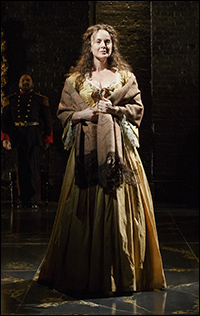 |
|
| Errico in Passion. | ||
| photo by Joan Marcus |
Errico: When you hear that you think…it's all malarkey, but then, when you actually do work with him, you realize that he's different than anyone in the world. It's really interesting—you spend almost every day dissecting the script from a different angle. Everyone on the stage, for example, one day, will have to focus all of our collective attention on a letter. If there's a letter in the scene, the letter is the focus. Everything that has to do with this letter. Now, of course, this play is all about letters. Letters are being passed around, letters are being written, letters are being sung, letters are being received. Mentally, the person is singing the [letter] that they had read, while the other person is on the other side of the stage writing it—it's all these letters. So one day you'll be with letters, the next minute, he'll be talking to you about rank—who is more important or who would like to go out to dinner with Fosca… Nobody! [Laughs.] So stand closest to the person that you would like to spend time with, so you end up getting all these senses of where the hotspots are—where your relationships are—then you understand rank. Then you talk about entrapment, whether it's the military or it's marriage or it's your gender or it's the 1830s, and so you spend a whole day thinking about it in terms of where you are trapped, in which ways you are restricted. By the end of six weeks—or five or six weeks—of rehearsals, you feel like the entire company is sort of mentally entangled. I know where every actor is. I feel like Jason [Michael Evans], who plays one of the soldiers, or Jeffry Denman—I feel like they've got my back. It's hard to explain. They shouldn't have Clara's back—they aren't even in any scenes with her, but they are sort of mentally because, in some ways, the soldiers are now really incorporated into the story. They stand around, they move chairs, they sing kind of like a Greek chorus—kind of in relation to the plot; whoever's suffering they sing…these complicated harmonies, and they're singing back these echoes—these themes. It's not just like, "Oh, now the chorus is singing their part." They come forward, and they feel completely important. And, we feel they're completely important, and there's none of this "my part, your part."
It's a long way of saying that John Doyle creates a company. He creates a sense of a fabric—that we're all a part of a fabric—and we all are in service to this fabric. None of us are more important than the other, and that it is Giorgio's story. He made that very clear that we are ultimately telling Giorgio's story, as much as Fosca is in our minds with Donna Murphy [winning the Tony for the original Broadway production] and the history of this story—we always think of her. The truth is—Sondheim has often said, too—that when he watched the Ettore Scola movie, he was struck by the fact that this beautiful soldier was starting to fall for this awful, sickly woman, and he said, "I realized soon into watching the movie, the movie was not going to be about her, but about how he falls in love with her and how he changes." His transformation—the turn in him—is what we're all waiting for.
| |
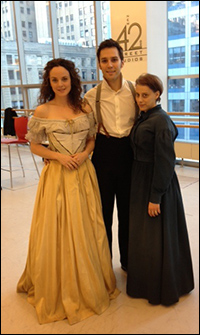 |
|
| Errico with Ryan Silverman and Judy Kuhn in rehearsal. |
Errico: I did. I did everything! I've done so much… I've had such a nerdy ride for this… I was at the original. I went on a date with my then boyfriend, the director of My Fair Lady, and that was one of our big dates when I was like 22 years old. We went on a date to see Passion.… It was a night off from My Fair Lady, and we went to see Passion together. It was a preview.
Question: Do you remember your response?
Errico: I do remember the audience laughing…with discomfort. I was in my very early 20s… Maybe I didn't understand. I remember thinking, "Oh my God, this woman!" When she came on to the train, I mean everyone laughed. And, that was why Sondheim said that it was so painful, that that's why he wrote "Loving You" just before opening night. It went in during previews because that train scene just did the audience in. They just laughed. They just were not on her side, and that "Loving You" was going to help that. Judy Kuhn, I don't think, has those problems. She's a different performer, and her interpretation is a little more understated and equally as grief-stricken and lonely—an unloved person—but perhaps a little easier and more palatable approach. I worship Donna Murphy, and that intensity has a place in this, too, but Judy has done it differently.
Question: How did you go about approaching the role of Clara?
Errico: Well, Clara has the same kind of trap where it can be typed. First of all, the first thing I thought of was, "Oh great, now I've got to be nude." [Laughs.] She's a lover, and she's pretty. That's pretty much all I remembered because, again, it was 20 years ago, and I wasn't the most sophisticated person. I wasn't necessarily understanding the complexity of love affairs and all that. But, what struck me right away, now in reading it, was that she's a mom. She's a mother, and the sort of erotic life of a mother—once your child is up and running and so on—there are these blanks in your own life, definitely in Clara's life. I found so much in it that I didn't know was there. I don't think that she is particularly unhappy in every way in her marriage. I got some cues from a book that's referred to… There's a book by Rousseau called "Julie," and the opening sentence, when Fosca enters, she says, "Oh I read the Rousseau novel, and the character of Julie is a great mystery," and I thought to myself, "Oh, I want to read that." … It's about a married woman having an affair. And, it just happens to be interesting because her husband is not a bad guy, and he wants her to be happy, but there's a spark lacking. There's something he can't reach in her, and there's a heightened happiness, a passion, a fire—insanity, actually, is what the book is about. The Rousseau novel is about an insanity of abandon that her husband just cannot bring to her life. And, she gets into this love affair. And, in reading that novel, I definitely saw that it was very, very useful for Clara. She's not abused, and I don't think her husband is an old man… I think he's a perfectly nice person, but Clara met this soldier, and there's this fantasy life that just sweeps her away. And, Sondheim's music gets so erotic, and I never recognized that before. I think John Doyle has really, really helped. I have no costume changes. Clara doesn't have to be nude, but I'm sort of undressed a bit… But most of the play I'm just in the same dress. I know that Clara had many, many costume changes in the original production—beautiful, beautiful clothes and dresses and parasols and hats. I have none of that. All I have is my mind, and I'm like a wandering mother, who has spare time. And, she is fixated on this sexy soldier, who has spiraled her into this passion—into a sexual, erotic life—and she's lost in it. And, she just goes bananas for a while. Eventually, Giorgio asks her if she'll leave her husband, and she just wouldn't—she couldn't. She would lose her child. She's not willing to give up everything for Giorgio, so when the rubber hits the road, she's not going to do it. And, Fosca, of course, intensifies her emotions for Giorgio, and he…realizes that Clara's got a limit to how far this will go for her. I'm not saying it wasn't in the original, I'm just saying we found so much. And I think being a mom myself to three little girls, and just applying some of that sense of responsibility and sense of absorption—the way they absorb you. And, I can just apply that to 1830s Italy, and then it's given this fantasy—it's a fantasy. And, it's tormenting for her if she's actually asked, "Would you actually leave your husband and child?" It's like no—she couldn't. She's too responsible. It's too big a commitment, but so, for a while, she's allowed this erotic dream. That's the kind of things that I've been thinking about and working with. It's been a thrill.
| |
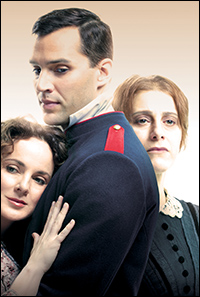 |
|
| Melissa Errico, Ryan Silverman and Judy Kuhn | ||
| Photo by Josh Lehrer |
Errico: I don't really know if we should even think of it as believable. It's a poem. I think what John Doyle would like you to think is that this is a poem, and these are ideas, and her love is without artifice and without superficial allure. There is no superficial allure. [Fosca] doesn't have the breasts and the corset and the hair and the things to allure a man… And, I think Sondheim believes that kind of thing exists—like a spirit, a spirit of love, and it's so fearless. It's almost like a child's love. It's like hunger. It's unstoppable, and I think what you're meant to feel is that Fosca stands for that kind of unstoppable, forward-moving, unencumbered, unselfconscious, unedited, un-manipulative, just forward love. Of course, she is very manipulative in the way she presents it in some ways, but, in a way, she doesn't mean to be manipulative. She's just so direct. Clara is so full of allure. She's full of her little fantasies, and she's got the child and the husband. She wants her cake and eat it, too, a little bit. She wants to fit him into her little program… What Sondheim is essentially saying is there are loves that fit into these little negotiations and patterns and comfort zones. That's not really love. Real love is this kind of oceanic, forward-moving honesty.
Question: It's interesting, though, because Fosca doesn't pick someone unattractive. She's going for this beautiful guy…
Errico: That's true. I think you're supposed to feel that she's surrounded by all these butch guys that are really lowbrow Italian men, who are making a lot of fart jokes and go to whorehouses, and who are kind of brutes. "They hear drums, we hear music. Be my friend," she says. The first thing that ties them is that he sends this Rousseau novel to her, and he's a veracious reader. Giorgio is a good-looking guy and all that, but there should be—and I think Ryan really accomplishes this—as masculine and as good looking and as sexual as he is with me, he has an extremely fragile, soft, feminine, loner-ish quality. So, if allowed, she is drawn, yes, to a good-looking man, and it is important… Fosca, in a way, is teaching him that it's not physical beauty—either his or her lack of—that really matters. It's this other essence that they share. I don't know, this is her case in court, anyway. But, you're right, she's flawed. She probably is flawed, and the poem is flawed. It's a little corrupt. This is all a little weird! [Laughs.]
| |
 |
|
| Sondheim sits in on a rehearsal. |
Errico: I would say he has been involved. He came to the rehearsal hall, and he watched us work. We did a run through for him. Then he came to the first and only sitzprobe, and he worked on the orchestrations right in front of us. He literally made changes with Jonathan Tunkick, who has done all new orchestrations for the show. So Jonathan had all his papers out, and all his assistants, and pens and things, and F# and F, and played again with the F, and played again with the F#, and Sondheim said, "I'll keep the F#, and if nobody likes it, we'll blame the clarinet player!" So he got the room laughing over little minutia like that. That was just delightful to watch happen in the room. So we watched that happen, and then he came to the very first preview, came to dress rehearsal, and then we did a live concert of the show—about six numbers from the show—on WQXR at the Green Space… It was televised, and Sondheim was on the panel, so he spoke all about how the play came about and how much he loves Italian cinema and this strange, strange movie, and he talked a lot about Fosca as a stalker, and she essentially is a stalker. I don't think he has a very pure way of talking about her, yet he seems madly in love with Fosca. He really seems to relate to her and respect her and kind of adores her insecurities and the depth of her feelings, so he says that Clara is the colder of the two because she follows rules. He called her colder. I don't feel that she's colder, but I guess it is colder in Sondheim's mind if you have any reasons not to love—if there's any reasons to control yourself in this play, you're in trouble. [Laughs.]
| |
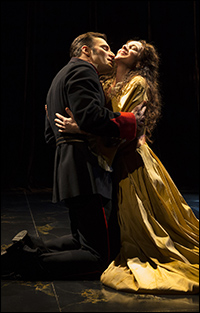 |
|
| Ryan Silverman and Melissa Errico in Passion. | ||
| Photo by Joan Marcus |
Errico: We have seen it as they are both very sexual and very aggressive in some ways. The play begins with an orgasm, and it ends with—pretty much—with one. Sondheim's idea was that it would begin with my scream, and that it would end with hers… That's how he saw it. He saw it as a complete balance of my ecstasy and hers… I think she's been very appreciative. She feels I found a lot of depth in a role that it didn't have, and it puts up a good fight, I think. I think I put up a pretty good fight for Giorgio.
Question: You mentioned before about being a mom and your kids being a little older. How old are they now?
Errico: [The twins] just turned four, and Victoria is six. I had three kids in two years. It just helps a little that they can understand a little bit where I am. I can bring them to the theatre… After this I'm going to spend the day with the girls. The ones who are in pre-school, I can pull them out of school and spend the time with them. They sleep through the night. I don't have anymore diapers to do. They're in school until 2:15 or 3:10, so they have lives now, somewhat. It just helps because until a year or two ago, I had everybody—or most of them—in diapers and pull-ups and stuff. It was insane. I had a two-year-old and two newborns, so it was a lot. And, this is the first time where I really feel, personally, like I'm sleeping. I feel fit. I feel the girls are really supportive and excited. Of course, this is not a very long run, so I don't feel like I'm going to strain them too far with Mommy not putting them to bed. But I guess I feel good. It's wonderful that I had children, and I'm just so happy for it, and I'm really happy that I'm able to do what I love, and they know it. Like, "Mommy, you have a show. Can we come to the theatre?" It's really healthy. Unfortunately, I don't take them to school right now. I oversleep. So I wake up in the morning, and I've got all these pictures that have been slid under my bedroom door… So I decorate my dressing room with these pictures. I don't think it's that bad for little girls to have a mom who is just super psyched to go and sing Sondheim every night. It's kind of a magical moment in our family. I feel really good about it, and I feel like it's really good for them to see me happy like this.
| |
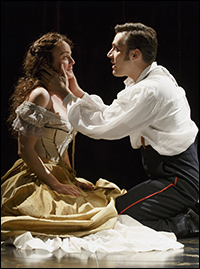 |
|
| Errico and Ryan Silverman in Passion. | ||
| photo by Joan Marcus |
Errico: There is talk of a recording, so we'll see how that pans out… Ryan sings beyond beautifully, and I just think we know the score so well, and with these original orchestrations, and Judy's incredible voice—it's so raw. I mean, her whole soprano-Cosette thing is in a whole new place. She sings so naturally, so I feel like all three of us and the ensemble, we know this score really well. We have it exact, and they killed us to get it exact. So I'd sure love to get to capture it, and John Doyle, again, has made us feel like we're all in this together. It's a wonderful accomplishment. He's an incredible person in that way. You don't feel nervous when you perform because you don't feel like it's all on you. You feel like you're a part of John Doyle's world. It's the weirdest thing. He makes you feel safe. It's the strangest thing to say, but when a director can get everybody to focus outside themselves—as much as I enjoy analyzing this and all the different parts and so on. There's a real structure, and he's let us see it from so many different facets. It's like we got to stand all around the show. [The stage has] three sides. I've been able to do the show from every side, so once I go back to my spot, and I'm playing Clara, I feel like I've seen it already from a million angles. I've never done that before. I've never been in a play where I feel like I've seen it from everybody's perspective. One day we did the whole play, and everybody, their entire focus had to be the doctor. Everything the doctor says, every time the doctor's on stage, everybody focus on the doctor. And, by the time it was over, Tom Nelis [who plays Doctor Tambourri] was weeping. First of all, he's doing such a great job, but it gave him so much power… And, every time he spoke or every time he had a comment, you never felt like he was just chipping in or a little comment at the dinner table. It was super important because the doctor was talking right now. And, John Doyle said, "It's going to be a little bit weird, but every time the doctor speaks, the king is here. The king of the story." And, it was so good for Tom. He did it for every actor by the way. It was amazing—even the smallest of parts.
[CSC is at 136 E. 13th Street. Tickets are $75 on Tuesday through Thursdays (select sides at $60) and $80 Friday through Sunday (select sides at $65). Passion plays Tuesdays and Wednesdays at 7 PM; Thursdays and Fridays at 8 PM; Saturdays at 3 PM and 8 PM; and Sundays at 3 PM. Passion will also have Wednesday matinees at 3 PM March 6 & 27 and April 3. For tickets, visit classicstage.org or call (212) 352-3101 or (866) 811-4111.] Well, that's all for now. Happy diva-watching! E-mail questions or comments to [email protected].



















